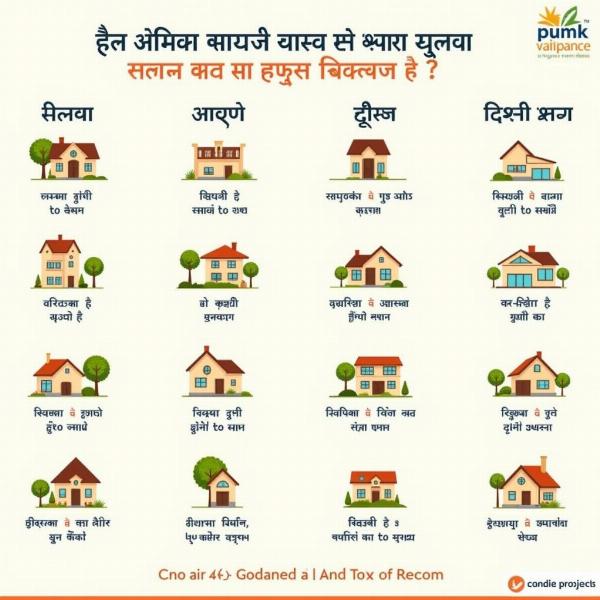Understanding the meaning of “residence” in Hindi is crucial for anyone navigating legal, administrative, or even everyday conversations in India. While a simple translation might suffice in some cases, grasping the nuances and cultural context behind the word enriches communication and avoids misunderstandings. This article delves into the various Hindi words used for “residence,” exploring their subtle differences and providing practical examples to help you use them correctly.
Different Hindi Words for Residence and Their Usage
The Hindi language offers several words to express the concept of “residence,” each with its own shade of meaning. Let’s explore some of the most common ones:
-
Nivas (निवास): This is a formal and respectful term for residence, often used in official documents or when referring to the dwelling of someone of high standing. Think of it as a more elegant way to say “abode” or “dwelling place.”
-
Ghar (घर): This is the most common and versatile word for “home” or “house.” It carries a sense of belonging and familiarity, encompassing not just the physical structure but also the family and emotional connections associated with it.
-
Makan (मकान): This term refers specifically to a building or structure used for living, emphasizing the physical aspect of a residence. It’s a more neutral term than “ghar” and is often used in legal or administrative contexts.
-
Aawas (आवास): This word signifies “dwelling” or “housing,” often used in the context of government schemes or social housing projects. It has a more general connotation than “makan” and can refer to a variety of dwelling types.
-
Grih (गृह): Similar to “nivas,” this is a more formal and literary term for “house” or “home.” It’s often used in religious or traditional contexts.
 Different Hindi Words for Residence
Different Hindi Words for Residence
Understanding the Context: When to Use Which Word
Choosing the right Hindi word for “residence” depends heavily on the context. For instance, if you’re filling out an official form, “nivas” or “makan” would be appropriate. However, in a casual conversation with friends, “ghar” would be the natural choice.
-
Formal contexts: Use “nivas,” “makan,” or “aawas” in official documents, legal proceedings, or formal correspondence.
-
Informal contexts: Use “ghar” when talking to friends, family, or in casual settings.
-
Religious or traditional contexts: “Grih” is suitable for religious ceremonies, traditional literature, or discussions related to ancient scriptures.
“Residence” in Legal and Administrative Documents
In legal and administrative contexts, the precise meaning of “residence” becomes particularly important. Here, “sthai niwas (स्थायी निवास)” refers to permanent residence, while “asthai niwas (अस्थायी निवास)” denotes temporary residence. Understanding this distinction is crucial for visa applications, property ownership, and other legal matters.
Residence vs. Domicile: A Key Difference
It’s also essential to differentiate between “residence” and “domicile.” While “residence” simply refers to the place where someone lives, “domicile” implies a more permanent and legal connection to a particular place. In Hindi, “domicile” is often referred to as “mool niwas (मूल निवास).”
Conversational Usage: How to Ask About Someone’s Residence
Knowing how to ask about someone’s residence politely is essential for navigating social interactions in India. Here are some common phrases:
- Aap ka ghar kahan hai? (आप का घर कहाँ है?): Where is your house? (Informal)
- Aap kahan rehte hain? (आप कहाँ रहते हैं?): Where do you live? (Informal)
- Aap ka niwas sthan kahan hai? (आप का निवास स्थान कहाँ है?): Where is your residence? (Formal)
Conclusion
Understanding the various Hindi words for “residence” empowers you to communicate effectively and respectfully in diverse situations. Whether you’re discussing legal matters, engaging in casual conversations, or exploring Indian culture, knowing the nuances of these terms will enhance your understanding and avoid potential misunderstandings. Remember to consider the context and choose the word that best reflects the situation and your relationship with the person you’re speaking to.
FAQ
- What is the most common Hindi word for “residence”? Ghar is the most common and versatile word.
- What is the difference between “nivas” and “makan”? Nivas is more formal and respectful, while makan refers to the physical structure.
- How do I ask someone where they live in Hindi? Informally, you can ask “Aap ka ghar kahan hai?” or “Aap kahan rehte hain?” Formally, ask “Aap ka niwas sthan kahan hai?”
- What is the Hindi word for “permanent residence”? Sthai niwas (स्थायी निवास)
- What is the Hindi word for “temporary residence”? Asthai niwas (अस्थायी निवास)
- What is the difference between “residence” and “domicile” in Hindi? “Residence” (niwas) refers to where someone lives, while “domicile” (mool niwas) implies a permanent legal connection to a place.
- When should I use the word “grih”? Grih is appropriate for religious or traditional contexts.
Meaning-Hindi.in is your trusted partner for accurate and culturally sensitive Hindi translation services. We specialize in various domains, including legal, business, technical, and academic translations. Whether you need document translation, website localization, or interpretation services, our expert team ensures high-quality results. For all your Hindi translation needs, contact us at [email protected] or call us at +91 11-4502-7584. Meaning-Hindi.in is here to bridge the language gap and facilitate seamless communication.